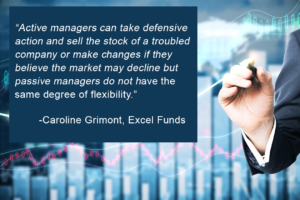(Sponsored Content)
When investing in emerging markets, the odds of outperformance are stacked in favor of active managers. That’s because, unlike developed markets, emerging markets are a heterogeneous and inefficient asset class. Each individual market and region possesses unique characteristics, risks and opportunities, which can be best leveraged through active, on-the-ground management.
The underlying truth is that indices such as the MSCI Emerging Markets Index that are used by passive managers to invest in emerging markets are a poor representation of opportunities in these markets. Indices typically include only the largest stocks by market capitalization and exclude potentially faster growing small and medium cap stocks which can be accessed by active managers.
And the fact that roughly two thirds of emerging market stocks are excluded from the respective indices means that investors in passive index-based investments lose the opportunity to participate in the growth of the majority of emerging market equities.
On the other hand, active on-the-ground managers have the advantage of being “free to roam” in making their investment decisions, compared to passive managers who are restricted to investing in stocks in an index over which they have no control.
As well, “in certain niche markets, like emerging market and small company stocks … it is possible for an active manager to spot diamonds in the rough,” states a Wharton, University of Pennsylvania article.[i] Conversely, the performance of passive managers is dictated by the index.
To put this reality in perspective, one of the world’s largest index providers, S&P Dow Jones Indices, highlights the shortcomings of using a broad-based passive strategy to invest in emerging markets in its research paper, Emerging Markets: What’s in your Benchmark? It surmises: “Numerous factors, including country and regional combinations, can create vast differences in performance and return patterns. If you’re looking to boost returns through exposure to international markets, you may want to dig deeper and consider looking beyond traditional broad-based benchmarks to truly assess the value of an allocation to any of the world’s emerging economies.”[ii]
Unconstrained by sector bias
Another benefit of using active managers in emerging markets results from the fact that they are not constrained by the dominant sector bias in EM indices.
For example, the Asia-Pacific region has significant exposure to information technology (IT) stocks, which currently represents 24% of The MSCI EM Index, up from 7% in 2008. But IT has insignificant representation in other emerging regions. On the other hand, Latin America and Emerging Europe have much higher weightings to commodities energy and materials, as these regions are home to natural-resource-rich countries such as Russia and Brazil. But the relative weight of commodities and materials stocks on the MSCI EM Index has fallen from 50% in 2008 to about 15% today. At the same time, various secular themes such as consumption, healthcare, education and green energy are currently key drivers in many emerging markets. These opportunities are best exploited by active management, as sector weights vary widely across Emerging Markets and are changing dramatically as EMs evolve.
Exploiting inefficiencies
Passive managers argue that the markets are efficient and that it is difficult to outperform an index. On the other hand, active managers believe that the markets possess mispricing opportunities that can be leveraged to outperform the index.
In an S&P report, Looking beyond Traditional Benchmarks to Add Value in Emerging Markets,[iii]it is recommended that “while accessing emerging markets through a single holding linked to a conventional benchmark is an effective, low-cost way to obtain unbiased exposure to this asset class, evidence indicates that a more discerning approach to manage emerging markets portfolios may potentially add value in the same ways it can in the US and other developed markets.” Such approach, in our opinion, is active management.
Passive management can be more risky
Active managers can take defensive action and sell the stock of a troubled company or make changes if they believe the market may decline but passive managers do not have the same degree of flexibility. Effectively, “passive investors can be hostages to the fortunes of troubled companies, even if they foresee those companies’ troubles”[iv] – as they have no control over security selection. As a result, passive managers have to endure index volatility to the detriment of investors, whereas active managers can make tactical shifts in asset allocation.
Indices can also present concentration risks which can result in greater losses should the fortunes of heavily weighted sectors take a turn for the worse.
Performance matters
One of the biggest arguments against active management in emerging markets is higher fees. While true, it must be noted that fees and expenses vary widely for both active and passive strategies.
At the end of the day, investors need to look at the returns they receive relative to the fees they pay.
“In our opinion, generating superior risk-adjusted returns comes down to picking the right stocks in sectors with sustainable growth potential. It must be recognized that regardless of market conditions, there will almost always be good growth stories within the universe of EMs through various market cycles. Capitalizing on such opportunities can be best achieved through active management,” says Christine Tan, chief investment officer and senior portfolio manager with Excel Investment Counsel Inc. in Mississauga.
[i] Active vs. passive investing: Which approach offers better returns? Wharton, University of Pennsylvania, 2015
[ii]Emerging markets: What’s in your benchmark? S&P Dow Jones Indices, 2013
[iii]Looking beyond Traditional Benchmarks to Add Value in Emerging Markets, S&P Dow Jones Indices, May 2013
[iv] ibid
Caroline Grimont is the SVP, Sales and Marketing at Excel Funds Management Inc. She has more than 23 years of domestic and international experience in marketing, sales and business development. Prior to joining Excel Funds, she was Head of Business Development with OANDA Corporation, one of the world’s leading foreign exchange trading platforms. She holds a Master’s degree from the National University of Singapore in International Economics and a Bachelor of Finance (first class honors), University College Dublin.Twitter: @c_grimont
Disclaimers: Commissions, trailing commissions, management fees and expenses all may be associated with mutual fund investments. Please read the prospectus before investing. Mutual funds are not guaranteed, their values change frequently and past performance may not be repeated. Some of the information has been provided by external sources and is subject to change at any time. Excel Funds is not responsible for the accuracy, reliability or timeliness of the information supplied by external sources. Users wishing to rely upon this information should consult directly with the source of the information. Content provided by external sources is not subject to official languages, privacy and accessibility requirements.




